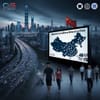The article argues that the recurring narrative of “This is the end of the world” is less a signal of actual collapse and more a familiar generational story—one where major change is misread as downfall. It posits that each generation tends to interpret disruption—climate change, political instability, technological upheaval—as evidence of impending societal collapse, rather than recognising it as transformation or adaptation. In doing so, the piece suggests, we mis-diagnose the moment and risk mis-responding to change.
It further examines why this mis-diagnosis takes hold. The author points to psychological, social and media dynamics: humans are hard-wired to pay attention to crises, and societies frame large-scale change in dramatic terms because it captures attention and mobilises belief. When technological or systemic shifts happen rapidly, people intuitively equate them with “the end” even if the paths of innovation and adaptation are far more complicated. The article emphasises that this pattern is recurring rather than novel.
Another key theme is the danger of treating change as collapse. By assuming institutions, norms or economies will simply disintegrate, we may neglect the work of transformation: building new systems, re-allocating resources, learning new skills, and forging new social contracts. The author argues that doing so amplifies risk—because when people believe collapse is inevitable, they may withdraw, become fatalistic or invest in escape rather than rebuild. From an organisational or policy perspective, this mindset shifts focus away from proactive resilience.
Ultimately, the article invites a more nuanced view: rather than seeing change through the binary filter of “collapse or continuation”, we should recognise that many systems are being re-shaped and re-wired. This means asking different questions: How do we adapt? What new structures can we build? Which parts of the old order are worth preserving and which must evolve? The message is a call for generational humility and strategic imagination: change doesn’t have to be the end, and framing it as such may blind us to opportunities.


